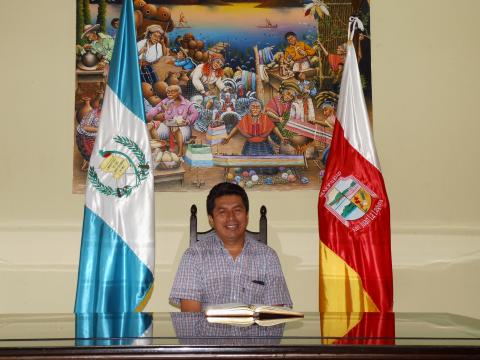
community need
Rija’tzuul Na’ooj (‘Seeds of Wisdom’) Library serves 14,000 people, mostly from Maya-Tz’tutujil and K’iche communities living in San Juan la Laguna, a small town and popular tourist destination on the shore of Lake Atitlán.
A history of social exclusion and discrimination means that poverty in Tz’tutujil and K’iche communities is widespread, and families struggle to earn a living from coffee farming. Maya-Tz’tutujil and K’iche communities are also famous for producing high quality traditional art and crafts, and so families try to supplement their income by selling their work to tourists.
The women are especially skilled weavers, using patterns and colours passed down by many generations of mothers and grandmothers. They work from home, combining housework, child-care and weaving, but because they lack education and business skills, they miss out on sales opportunities and are vulnerable to exploitation by buyers.
the innovative service
The library’s Business Centre offers a solution. The centre was launched in February 2013, with technical and training support from the library’s partner, the Riecken Foundation, and funding for equipment, resources and implementation from the BFB Foundation. The centre now offers free internet access, ICT and business skills training, space for the women to meet, and shelves packed with up-to-date books and journals on business skills and management.
Through the library, the women have learnt to include the cost of their labour and raw materials in the prices they set for their fabric. They have also learnt to manage product quality and use computers to prepare accounts. Internet skills include tracking market trends online, finding customers, marketing and selling fabric online and communicating with clients by email. Recently, the women have started using social media, like Facebook, to advertise their products.
“I always feel welcome at the library and I receive help whenever I need it,” Mrs Rosalinda Tay of the Lema Artisans' Association told the library.
A special map to attract customers
A special project is creation of a map, using GPS technology. The map shows customers and tourists the location of the women’s craft cooperatives and the houses where women are making fabric, so that buyers can find them easily. The map also shows the location of tourist markets and shops where the women sell their work.
In just four months, more than 380 women registered with the Business Centre and have completed short courses. About 35 women, many representing weavers’ and dyers’ co-operatives, now regularly come to the library to use the computers, to meet and to attend workshops and seminars.
more libraries empowering women and girls
Read about more innovative public library services that use ICT to empower women and girls. PLIP-WOMEN-AND-GIRLS





